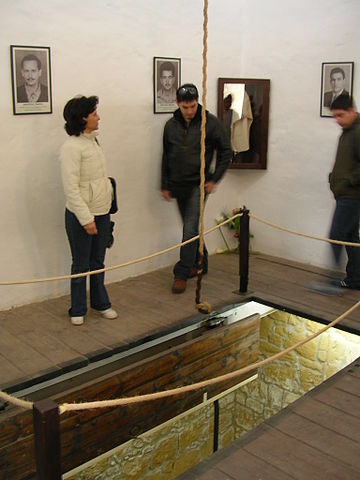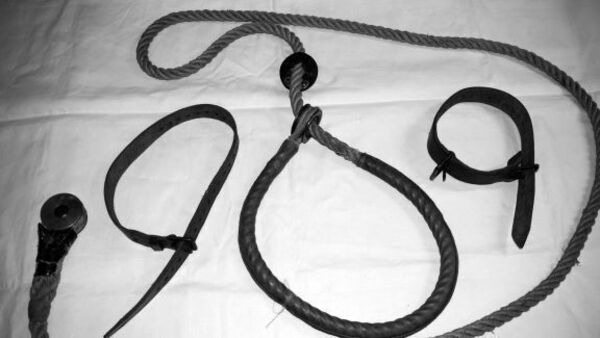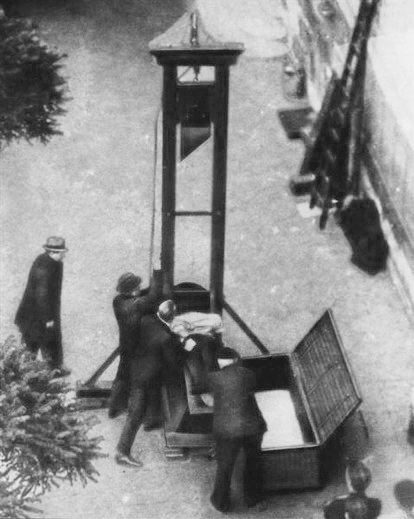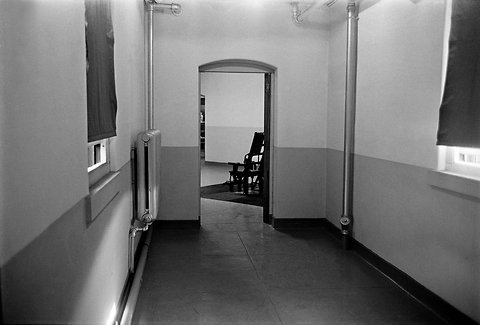Well, seeing as it’s New Year’s Eve and I’m feeling generous, here’s something especially unusual. It’s not often that a President and an executioner meet, especially on a professional basis. US President Grover Cleveland was a notable exception, although he performed his two hangings while Sheriff of Erie County long before entering the White House.
Greek gunman, politician, journalist and publisher Nicos Sampson (later to become President of Cyprus for only eight days) almost met British chief executioner Harry Allen on a professional basis, but not quite A particularly vicious member of independence group EOKA, Sampson was reprieved only minutes before meeting Allen atop the scaffold at Nicosia Central Jail in 1958. Had their meeting gone as planned Sampson wouldn’t have been around to for the abortive military coup of 1974.
Before independence in 1960 Cyprus was a hot-bed of anti-colonial and anti-British feeling. It was also a hot-bed of violence and Nicosia’s Ledra Street was the epicentre. So many British soldiers, police officers and citizens died there that it became known as the ‘Murder Mile’ and the ‘Executioner of Murder Mile’ was the would-be President Nicos Sampson.
Sampson was known to have committed at least fifteen murders and probably many more. He openly boasted of his handiwork, including crimes of which he’d been acquitted. In 1958 he’d been tried for his part in the murders of police officers Cyril Thoroughgood and Hugh Carter, a crime he later boasted of being involved in. A thord officer, William Webb, was eriously wounded but survived. Managing to convince the trial judge that his confession had been extracted by torture, Sampson was acquitted. A month later he found himself facing another possible death sentence and this time he wasn’t so fortunate.
The Colonial Governor of Cyprus was Field-Marshal Sir John Harding. A veteran of the both world wars and the Malayan Emergency, Harding was a tough-minded man with a hard line on those he regarded as terrorists. For Harding EOKA were a problem and the gallows at Nicosia Central was a permanent cure.
In line with his tough stance Harding had introduced broad emergency powers, including the death sentence for crimes other than murder. When the notorious Sampson was again arrested, this time on a charge of illegally carrying arms, that was a capital offence and Sampson could easily hang. It would certainly have suited the British authorities (and might have better served Cyprus itself) if he had.
Harry Allen was no stranger to Cyprus or Nicosia Central’s scaffold, having hanged nine men there already. On 10 March 1956 EOKA members Michalis Karaoilis and Andreas Dimitrou had made their final walk. On 9 August he’d returned, leaving behind him the empty cells of Iakovos Patasos, Andreas Zakos and Harilados Michael. Michael Koutsoftos, Stelios Mauromattis and Andreas Pangidis had kept their date with the hangman on the night of September 21 and Evagoras Pallikandis followed them on 14 March 1957.
Allen probably wasn’t surprised to receive a letter from the colonial authorities in Cyprus asking again for his services. On 31 December 1957 one duly arrived and Allen, a veteran hangman with no qualms about his profession, duly accepted. Had it gone ahead his next ‘job’ in Cyprus would probably have been Sampson.
Sampson found himself confined in Nicosia Central’s Ward Seven, the Cypriot equivalent of Death Row. He wasn’t alone, but he was under observation every minute of every day. Ward Seven’s cells were small with only a bucket for his natural needs. He only got one hour’s exercise a day and even cigarettes had to be handed to him by his British jailers.
Ward Seven wasn’t by any standards a fun place to be, but it was distinctly better than Ward Eight only a few steps away. Ward Eight contained only two cells assigned to condemned prisoners for their last two days of life. Only three metres away from those cells was Nicosia Central’s gallows, a short walk to the long drop.
There was little for Sampson to do but wait and wait and wait. As it turned out what should have been his last moments on Earth probably felt like the longest of his life. As usual he was moved to Ward Eight on 8 September 1958 away from his fellow prisoners and friends. Neither he nor they expected to ever see him again.
While future-President Sampson watched the clock tick relentlessly down Harry Allen and assistant executioner Harry Smith arrived. After taking a covert look at Sampson during his exercise time they worked out their intended drop based on his height, weight and physique. That done, they tested and reset the gallows while Sampson was elsewhere.
With the tests being vital and the gallows so close to Sampson’s cell they didn’t want to distress him any more than they had to. Sampson showed no sign of knowing they were nearby, but when he was weighed he must have realised the colonial authorities were serious. Nicos Sampson was going to hang and he knew it. Except he wasn’t.
British prisons usually performed executions at either eight or nine in the morning. Nicosia Central was different, performing them shortly after midnight or in the early hours of the morning much as America’s prisons do today. It’s an old saying that the darkest hour is the one just before the dawn, but not for Sampson. As far as he knew he’d seen his last dawn. He’d be seeing the next one from inside a coffin.
Cyprus hangings were small affairs, deliberately so. No journalists were admitted. Only the two hangmen, prison governor and prison doctor attended with a couple of prison officers in case a prisoner resisted. Not forgetting the prisoner, naturally. The gallows, though still able to hang three prisoners at the same time, was in a small room with no room at all for outsiders.
As the hours passed and midnight neared Allen and Smith waited silently outside Sampson’s cell door. The gallows was ready, the drop set and all that was needed was a silent nod from the prison governor. When the clock started to chime the governor would nod, Allen and Smith would enter the cell. Sampson would be dead before the clock finished chiming.
Only the prison governor wasn’t there and neither Sampson or his executioners knew where he was. One thing the hangmen did know was that without his signal Sampson remained alive. Allen and Smith waited. The prison doctor waited. Sampson, knowing he was literally at death’s door and the men outside were there to drop him through it, waited, and waited, and waited.
What, he wondered, was going on? The hour had come and gone and he was still alive. Was there still hope even at the last second? Normally prisoners never got a last-minute reprieve, usually knowing their fate a day or two beforehand at the least. Sampson was still alive when he should have been dead. Why? For Sampson the next fifteen minutes probably seemed like fifteen lifetimes.
It was then that the prison governor finally did arrive bearing a message from Governor Harding. The job was off, Harding had granted a most unusual reprieve and Sampson would live. The next morning Allen and Smith returned to England and Sampson followed them to serve his time in an English prison. That time would be shorter than anyone, including Sampson, expected.
To quote one witness:
“The hangman and his assistant arrived at the condemned cell on the stroke of midnight. All they needed was confirmation from the prison governor to go ahead. They stood there for what must have seemed a very long fifteen minutes. Then the governor arrived with a message from the Governor of Cyprus, Sir John Harding, to say it was all off. That was a close thing.”
In 1960 the former colony was granted its independence and Sampson returned home to a hero’s welcome. The warm welcome wasn’t to last long. A Greek Cypriot, Sampson had adopted a virulent attitude toward the Turkish Cypriot community. Openly advocating violence against them Sampson went further, joining a paramilitary group and pursuing a terror campaign against his enemies. The independence deal reached with the British had left many dissatisfied with its conditions and Sampson, fanatical to a fault, took full advantage. In 1974 his fervour went one step too far.
When a military junta sought to take power they enlisted Sampson as their political figurehead. With President Makarios deposed, the former ‘Executioner of Murder Mile’ became the new President of Cyprus, going from Nicosia Central’s condemned cells to the President’s office. The coup, though, didn’t last and neither did Sampson’s ‘Presidency’. After only eight days the Turkish Army entered Cyprus to protect the Turkish-Cypriot community and Cyprus found itself partitioned between the two groups.
With Makarios reinstated ‘President’ Sampson again found himself again at Nicosia Central, this time charged with usurping the Presidency. Sentenced in August 1976 he drew twenty years, not tasting freedom again until 1991. By then many Greek-Cypriots reviled the former national hero for the outcome of the coup. Loathing his virulent bigotry and fearing his violence many Turkish-Cypriots already hated him anyway. He spent his later years as a newspaper publisher, still spouting his hatred for the Turkish-Cypriots and the British before dying of cancer on 9 May 2001.
Sampson wasn’t the only one making a return to Cyprus. The death penalty had remained even after the British departed and Allen, known to the new government of Cyprus, was still available. On 13 June 1962 Allen (assisted by John Underhill) returned to Nicosia Central for the last time. Behind him were left the bodies of murderers Hambis Zacharia, Michael Hiletikos and Lazarus Demetriou. Nobody knew it at the time, but it was Allen’s last visit.
With the suspension of hanging in 1964 Allen had no ‘jobs’ left to do. His 49th and last was one of Britain’s two simultaneous last executions on 13 August 1964. While Allen was hanging Gwynne Owen Evans at Strangeways prison in Manchester, Robert Leslie Stewart was hanging Evans’ accomplice Peter Allen at Liverpool’s Walton Prison. After that the gallows doors never dropped again, most of them being dismantled in the years that followed. Allen, now Britain’s former chief executioner, was out of a job. He died on 14 August 1992.
Field-Marshal Sir John Harding, last colonial Governor of Cyprus, fared rather better. A Knight of the Realm, Field-Marshal and former Chief of the Imperial Defence Staff, On his retirement Harding returned from Cyprus to become Baron Harding of Petherton in 1958. He died on 20 January 1989.
Having gone from national hero to national pariah, Sampson hadn’t done well in later life. It may have been some small satisfaction that he outlived both his executioner and the man who (perhaps unwisely) had helped him cheat the hangman. Today Nicosia Central’s Wards Seven and Eight are a museum dedicated to the men who died there during the fight for Cypriot independence. Thirteen men (nine hanged, one killed in a firefight and three who died of wounds) lie in the ‘Imprisoned Graves’ section of the old prison. The gallows too remains having outlived all those who saw it used.





Leave a Reply